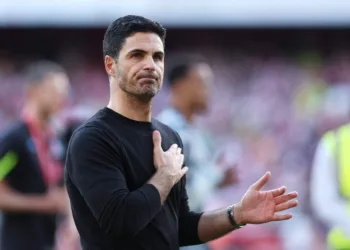The roar of the crowd, the glare of stadium lights, and the weight of expectation—for some footballers, this experience in the Premier League comes just once. While legends like Thierry Henry and Cristiano Ronaldo carved out illustrious careers spanning hundreds of matches, a select group of players saw their Premier League journey begin and end in a single 90-minute window.
Among the 5,068 players who have graced England’s top flight since its inception, 380 belong to an exclusive yet bittersweet club: the one-appearance collective. That’s 7.5% of all Premier League players who featured in just one game in the competition. These are football’s shooting stars—burning bright for one fleeting moment before disappearing into obscurity. Some departed with dignity, others with infamy, but all share a peculiar bond that connects them across three decades of Premier League history.
They are the extras of the Premier League world—blending into the background of football’s grandest stage while the leading stars command the spotlight. Yet occasionally, one of these extras makes themselves unforgettable, often for reasons no footballer would desire.
Table of Contents
The Infamous Ali Dia: Football’s Greatest Deception
No discussion of single-appearance players would be complete without Ali Dia, whose name has become synonymous with football’s most audacious con. Sunday, November 23, 2025, will mark 29 years since one of the most talked-about debuts in Premier League history.
Southampton manager Graeme Souness received a phone call from someone claiming to be George Weah—the reigning FIFA World Player of the Year and Ballon d’Or holder. The caller vouched for his “cousin” Ali Dia, describing him as an international-caliber Senegalese forward worthy of a Premier League opportunity.

Souness took the bait.
Standing on the sideline in his number 33 shirt against Leeds United, Dia entered as a first-half substitute to replace the injured Matt Le Tissier. Not many substitutions in Premier League history will have seen a wider gap in footballing talent between the two players exchanging places on the pitch. What followed was 53 minutes of footballing chaos that would cement Dia’s place in Premier League folklore—for all the wrong reasons.
His touch was poor, his positioning worse, and his overall performance so catastrophic that he suffered the ignominy of being a subbed substitute—withdrawn before the match ended. Dia’s career in English professional football ended that day, never to be seen again. One Premier League appearance and out.
| Ali Dia’s Premier League Record | |
|---|---|
| Appearances | 1 |
| Minutes Played | 53 |
| Goals | 0 |
| Assists | 0 |
| Outcome | Subbed off as substitute |
| Notable Fact | Duped manager via George Weah impersonation |
Yet his legacy endures as a cautionary tale about due diligence and the desperation that can cloud judgment in football’s pressure-cooker environment. He might have been one of the worst, but he’s by no means the only player to feature just once in the competition.
When International Pedigree Met Premier League Reality
Not every member of the one-appearance collective lacks talent. Turkish midfielder Yildiray Bastürk arrived at Blackburn Rovers with an impressive résumé that would shame many Premier League regulars. Before his solitary English top-flight outing, he had accumulated 249 Bundesliga appearances, featured in the 2002 UEFA Champions League final for Bayer Leverkusen, and was part of the Turkey side that finished third at the 2002 FIFA World Cup.
His single Premier League appearance came in a 1-1 draw at Molineux versus Wolverhampton Wanderers. Starting the match, Bastürk was withdrawn at halftime and never seen in the competition again. Despite his decorated career, the Premier League proved an impenetrable fortress.
Dutch international Richard Witschge boasted an even more decorated career before his solitary Premier League appearance for Blackburn Rovers against West Ham United in April 1995. The midfielder had won La Liga with Barcelona twice and lifted the 1992 European Cup before claiming a 1998 Eredivisie title with Ajax. Yet England’s top flight granted him just one fleeting visit.
Ferdinand Coly won’t be fondly remembered by Birmingham City fans for his one-game spell in 2003 while on loan from Ligue 1 side Lens, but context matters. He was a key part of Senegal’s excellent 2002 World Cup side that shocked defending champions France in the opening match and finished as runners-up in the Africa Cup of Nations that same year.
These cases underscore an important reality: appearing only once in the Premier League doesn’t necessarily indicate lack of quality. Sometimes, timing, injuries, or tactical fit simply don’t align. Look, playing just one game in the Premier League doesn’t necessarily make you a bad footballer.
Matt Murray: When Debut Day Becomes Nightmare Territory
Some one-appearance stories carry genuine tragedy. Goalkeeper Matt Murray’s sole Premier League outing came in the most brutal circumstances imaginable, and injuries would cruelly rob him of a longer football career thereafter.
Wolverhampton Wanderers’ opening fixture of the 2003-04 season saw them demolished 5-1 at Blackburn Rovers, making Murray the only goalkeeper to have played just once in the Premier League and be on the end of such a thrashing. It makes you wonder how catastrophic the scoreline might have been without his efforts—Murray managed to tally seven saves in his sole Premier League appearance despite the five goals conceded.
His story represents the harsh reality that talent alone cannot overcome circumstance and misfortune in professional football.
The Four Goalscorers Who Vanished Into History
Four players have managed something truly remarkable—scoring in their only Premier League appearance before disappearing into the competition’s history books forever.
| Player | Club | Opposition | Result | Date | Current Age | Playing Status |
|---|---|---|---|---|---|---|
| Gary Bull | Nottingham Forest | Crystal Palace | 1-0 win | January 2, 1995 | 59 | Retired |
| Aidan Newhouse | Wimbledon | Aston Villa | 2-3 loss | October 3, 1992 | 53 | Retired |
| Chris David | Fulham | Crystal Palace | 2-2 draw | May 2014 | 32 | Still playing (Turkey) |
| Josh Harrop | Manchester United | Crystal Palace | 2-0 win | May 2017 | 28 | Active |
Gary Bull is now 59 years old, so it’s safe to say he won’t leave the ‘played once’ club. On his only Premier League appearance, he scored the winning goal in a 1-0 victory for Nottingham Forest against Crystal Palace on January 2, 1995—the perfect one-and-done scenario.
Aidan Newhouse scored for Wimbledon in their 3-2 home defeat to Aston Villa on October 3, 1992, after coming on as a 23rd-minute substitute. He never got the chance to add to his tally, and with Newhouse now 53 years old, it won’t happen in the future either.
Chris David is still playing football in the Turkish lower leagues, but it’s unlikely he’ll ever add to his one-appearance-one-goal record in the Premier League despite still being just 32 years old. His late equalizer for Fulham in their 2-2 final-day draw with Crystal Palace in May 2014 saw him score on his only appearance in the competition.
He’s also got a strong claim to the greatest goal by any ‘played once’ player—his strike was a brilliant 25-yard shot that flew in off the crossbar. The technique, power, and placement marked it as a moment of genuine quality that deserved a longer Premier League career.
Josh Harrop completes this quartet under the most unique circumstances. He was one of four players given their first top-flight start by Manchester United manager José Mourinho on the final day of the 2016-17 season for a game against Crystal Palace. Mourinho named what was, at the time, the Red Devils’ youngest starting XI in Premier League history at 22 years and 284 days average age.
Harrop scored in United’s 2-0 victory, but it would be his final Premier League appearance. Demetri Mitchell and goalkeeper Joel Pereira were two of the other three debutants for United in that match—and neither of those have played again in the Premier League either. The fourth debutant, Scott McTominay, has done alright, we’d say, going on to make over 250 appearances for Manchester United and establishing himself as a regular. Angel Gomes also made his Premier League debut as a 16-year-old substitute in that same match but went on to play four more times in the competition before departing.
Christian Negouai: The Unforgivable Debut
Christian Negouai holds a dubious distinction no footballer would covet: he remains the only player to have been sent off in his only Premier League appearance to this day.
Entering as an 81st-minute substitute for Manchester City against Everton on Boxing Day 2004, Negouai’s Premier League dream lasted mere minutes before a shocking tackle earned him a straight red card just minutes later. That fleeting cameo represented his entire Premier League experience—a nine-minute window that ended in disgrace rather than glory.
His story serves as a cautionary tale about composure under pressure and making first impressions count when opportunities are scarce.
Lucas Piazón: The Penalty That Never Was
One player who had a golden chance to join the goalscoring list was Lucas Piazón, and his near-miss haunts what could have been a perfect debut.
Almost 12 years have passed since the Brazilian’s only Premier League appearance—a late substitute appearance for Chelsea in their 8-0 destruction of Paul Lambert’s Aston Villa on December 23, 2012. Within minutes of entering the pitch, Piazón assisted Eden Hazard for Chelsea’s seventh goal, announcing his arrival with creativity and vision.
Then came the moment that could have changed everything. After being fouled inside the penalty area, Piazón was given the chance to score on his debut from the penalty spot. The young Brazilian stepped up, only to see his effort saved by Brad Guzan.
That missed penalty represents the finest of margins between vindication and obscurity. Had he scored, Piazón would have joined an elite group of one-appearance goalscorers. Instead, he remains a footnote—the player who almost made his single Premier League appearance perfect.
Manchester City: The Club of Single Appearances
When examining which clubs have fielded the most one-appearance players, Manchester City leads the Premier League with 22 different players making just one appearance in the competition for the club. They are followed in the ranking by West Ham United with 18 players, Chelsea with 18, Arsenal with 17, and Manchester United with 17.
| Club | One-Appearance Players |
|---|---|
| Manchester City | 22 |
| West Ham United | 18 |
| Chelsea | 18 |
| Arsenal | 17 |
| Manchester United | 17 |
The last two players to join Manchester City’s list—Vitor Reis and Claudio Echeverri—will be expected to appear again in the future by most supporters, though history suggests such predictions require caution.

This statistic reflects not just squad depth but also the dramatic transformations some clubs have undergone. City’s position atop this list tells a broader story about the club’s evolution from mid-table mediocrity to global powerhouse.
Gláuber: The Symbolic Transition
Gláuber’s story perfectly encapsulates Manchester City’s metamorphosis and arguably marks the point that Manchester City moved from Old City (think: David James up front) to New City (think: Sergio Agüero up front).
The Brazilian had appeared for Brazil in a friendly against Guatemala in 2005, making him technically an international footballer with legitimate credentials. Signed by City in late August 2008—the day before the club bought Robinho in a transfer that signaled the beginning of their transformation—Gláuber had to wait until the final day of the season for his one Premier League game.
It was a 1-0 win over Bolton Wanderers, in which he was raucously cheered by fans who may have realized the club’s ‘banter era’ was fading before their very eyes. Gláuber may not have featured for City again, but he completed all five of his passes in the five minutes he was given.
How many people can say that they have a 100% pass completion rate for Manchester City in the Premier League? Gláuber’s perfect statistical record serves as an amusing footnote to City’s journey from laughingstock to powerhouse.
Arsène Wenger: The Manager of Single Chances
It won’t come as much of a shock to learn that Arsène Wenger has given the most players their only Premier League appearance—14 instances across his legendary tenure. The Frenchman took charge of a record 828 matches in the competition, providing ample opportunity to rotate squads and test fringe players.
The last time he did this in a Premier League game was in January 2012 versus Manchester United, when both Park Chu-Young and Li Ke (formerly known as Nico Yannaris) were given their only appearance in the competition, coming on as substitutes in a 2-1 home defeat. Both players entered with hopes of establishing themselves but never received another opportunity in Arsenal colors.
Wenger’s willingness to give youth opportunities and rotate his squad contributed significantly to this record, though it also reflects the depth and quality of his Arsenal squads that made breaking through so challenging.
The Age Extremes: From Teenage Dreams to Veteran Swansongs
Graham Rix (37 years and 203 days) is the oldest player to play just one Premier League game, turning out for Chelsea versus Arsenal in May 1995. His appearance represented a veteran’s final taste of top-flight football, a swansong that came and went in 90 minutes.
At the opposite extreme, Neil Finn is the youngest of the ‘played once’ selection at just 17 years and three days old. He also remains the youngest goalkeeper to play a Premier League match, starting for West Ham United against Manchester City on New Year’s Day 1996. Despite this historic debut, Finn never made another appearance in the competition, his teenage dream beginning and ending on the same day.
The 20-year age gap between the oldest and youngest one-appearance players illustrates how diverse circumstances lead to single-game careers—from veterans grasping final opportunities to teenagers receiving chances they cannot convert into regular football.
The Calendar of Single Chances: May’s Dominance
Timing reveals much about these fleeting careers, and the data shows a clear pattern in when players receive their solitary opportunities.
Of the 380 players to have made just one Premier League appearance, a staggering 93 have done so in the month of May—representing 24.5% of the total. That’s more than double any other month, with January coming second at 41 appearances.
| Month | One-Appearance Debuts | Percentage |
|---|---|---|
| May | 93 | 24.5% |
| January | 41 | 10.8% |
| April | ~38 | ~10% |
| Other months | ~208 | ~54.7% |
Of course, most Premier League debuts for youngsters are handed out in the final month of the season when there is little or maybe even nothing to play for. The data becomes even more telling when we narrow it further: sixty-seven of those May appearances have come in a club’s final game of the season—the ultimate low-stakes environment where managers feel comfortable experimenting.

January ranks second, coinciding with the transfer window and mid-season squad evaluations when loan deals create opportunities and managers assess their depth. This calendar pattern illustrates how the Premier League’s structure influences opportunities for fringe players, with end-of-season dead rubbers providing the most common pathway to single appearances.
The Statistical Reality of One and Done
The numbers behind the one-appearance collective tell their own compelling story:
- Total Premier League players (all-time): 5,068
- Players with exactly one appearance: 380
- Percentage of all players: 7.5%
- Players who scored in their only match: 4
- Players sent off in their only match: 1 (Christian Negouai)
- Goalkeeper to concede most in only match: Matt Murray (5 goals)
- Goalkeeper with most saves in only match: Matt Murray (7 saves)
- Oldest one-appearance player: Graham Rix (37 years, 203 days)
- Youngest one-appearance player: Neil Finn (17 years, 3 days)
- Most May debuts: 93 (24.5% of all one-appearance players)
- Final-day debuts: 67
- Club with most one-appearance players: Manchester City (22)
- Manager who gave most single-appearance debuts: Arsène Wenger (14)
These statistics paint a picture of a competition where opportunities are precious and second chances are rare. The 7.5% figure means that for every 100 players who reach the Premier League, approximately seven or eight will never play a second match.
The Diverse Paths to Obscurity
The one-appearance collective encompasses every possible circumstance that can end a Premier League career before it properly begins:
Youth players tested and discarded dominate the list—teenagers given final-day opportunities who fail to impress or find their pathway blocked by superior talent. Mourinho’s 2017 experiment with Manchester United’s youngest-ever starting XI produced three one-appearance players alongside future regulars.
Loan deals gone wrong account for numerous entries, with players arriving mid-season, failing to adapt, and returning to their parent clubs or moving elsewhere. Ferdinand Coly’s Birmingham stint exemplifies this category.
Injury victims like Matt Murray represent the tragic element—players whose bodies betrayed them just as opportunity arrived.
Emergency signings and panic buys occasionally appear, with clubs desperately seeking cover but discovering the player cannot cope with Premier League intensity. Ali Dia remains the most extreme example.
International veterans on brief English sojourns feature prominently—established stars like Bastürk and Witschge whose Premier League experiments failed despite impressive résumés.
The red card recipient stands alone—Negouai’s disciplinary disaster ensuring no manager would risk him again.
The penalty misser—Piazón’s failed spot-kick symbolizing how fine margins determine careers.
Each path leads to the same destination: a single line in the Premier League’s record books and a story that ends before it truly begins.
Why One Appearance Matters
Some might dismiss the one-appearance collective as footnotes, failures, or statistical curiosities. Yet these 380 players represent something profoundly important about the Premier League and professional football itself.
They humanize the competition. While we celebrate the Henrys, Gerrards, and Shearers who dominated for years, these fleeting careers remind us of the Premier League’s unforgiving nature. Talent, preparation, and dedication offer no guarantees. Circumstances—a manager’s tactical preference, an ill-timed injury, a single poor performance—can end dreams in 90 minutes.
They represent achievement beyond reach for millions. Every one of these players reached English football’s summit, however briefly. They trained at elite facilities, shared dressing rooms with world-class teammates, and experienced Premier League intensity. That single appearance places them among the fortunate few who can say, “I played in the Premier League.”
They illustrate football’s lottery elements. Chris David’s spectacular goal deserved a career. Bastürk’s Champions League pedigree suggested longevity. Josh Harrop’s composure warranted opportunities. Yet all received just one chance. Football’s meritocratic myth meets reality in these stories—sometimes talent isn’t enough.
They provide perspective for fans. When supporters criticize players for poor performances, the one-appearance collective reminds us how quickly careers can end. That struggling substitute might be fighting for his professional life. That nervous debutant might never play again. Empathy costs nothing.
The Ever-Growing Collective
More players will inevitably join this group. As the Premier League continues evolving—with deeper squads, increased competition, and tactical complexity—the collective will expand. More youngsters will receive final-day opportunities that lead nowhere. More loan deals will produce singular appearances. More circumstances will conspire to grant players just one taste of football’s most competitive league.
Recent seasons have already added names that will likely never appear again. Some remain hopeful—young players believing their chance will come. Others have moved on—finding success in Championship, League One, or abroad, content with their single Premier League memory.
The beauty of this collective lies in its diversity. International superstars share space with pub league players who conned their way in. Goalscoring heroes stand alongside red card villains. Teenagers join veterans. The unlucky commune with the untalented. All united by the same statistic: one appearance.
The Final Word
The Premier League’s one-appearance collective will never grace highlight reels or feature in title-winning montages. They won’t have statues erected or stands named in their honor. Most fans will never remember their names, and many will remain answers to trivia questions or statistical curiosities.
Yet these 380 players—from Ali Dia’s infamous hoax to Gary Bull’s perfect debut, from Christian Negouai’s red-card disaster to Chris David’s spectacular strike, from Graham Rix’s veteran cameo to Neil Finn’s teenage dream—deserve recognition. They reached the pinnacle of English football and experienced something most players never will.
Their collective story reminds us that football careers are fragile, opportunities are precious, and second chances are rare. It teaches us that quality doesn’t guarantee longevity, that one mistake can define a career, and that timing matters as much as talent.
As supporters watch the next generation of one-appearance players emerge—youngsters receiving final-day opportunities, loan players making brief cameos, veterans grasping last chances—we should remember the 380 who came before. They played in the Premier League once.
And that’s still one more than most of us will ever have.
Read More: How Haiti Reached the 2026 World Cup Without Ever Playing at Home
FAQs
Who is the most famous Premier League one-appearance player?
Ali Dia remains the most infamous after his 1996 Southampton debut. Someone impersonating George Weah convinced manager Graeme Souness that Dia was the world player’s cousin. He lasted 53 minutes before being substituted off and never played professional football in England again.
Which players scored in their only Premier League match?
Four players achieved this: Gary Bull (Nottingham Forest, 1995), Aidan Newhouse (Wimbledon, 1992), Chris David (Fulham, 2014 – scored a spectacular 25-yard strike), and Josh Harrop (Manchester United, 2017).
Has anyone been sent off in their only Premier League appearance?
Yes, Christian Negouai is the only player to be sent off in his sole Premier League match. He came on as an 81st-minute substitute for Manchester City against Everton on Boxing Day 2004 and received a straight red card just minutes later.
Which club has the most one-appearance players?
Manchester City leads with 22, followed by West Ham United and Chelsea (18 each), then Arsenal and Manchester United (17 each). City’s Gláuber maintained a perfect 100% pass completion rate, completing all five passes in his five-minute appearance
Do one-appearance players lack quality?
Not necessarily. Yildiray Bastürk had 249 Bundesliga games and played in the 2002 Champions League final. Richard Witschge won La Liga twice with Barcelona and the 1992 European Cup. Ferdinand Coly starred in Senegal’s 2002 World Cup team. Circumstances often matter more than ability








